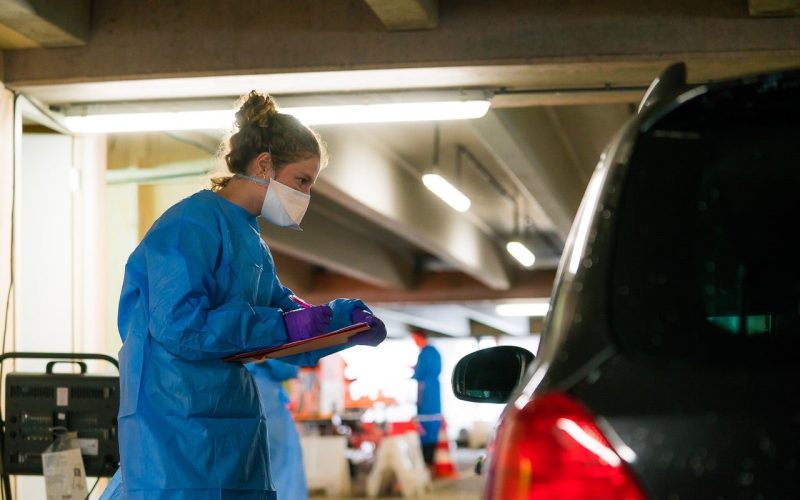The results of a study into the effectiveness of early antigen rapid testing in people who have been closer than 1.5 meters to a person infected with SARS-CoV-2 for more than 15 minutes, were published last week. More than 8 percent of the group of close contacts who had no complaints at the time of making the appointment were tested positive for SARS-CoV-2 from day 5 after the contact with an RT-PCR. The antigen rapid test is also sufficiently accurate to detect a corona infection in such close contacts at an early stage without complaints but with a high viral load.
Some people are already contagious prior to having complaints, and it also occurs that people do not get any complaints at all even though they are infected. Testing and isolating as soon as possible in case of a positive test is therefore of great importance. This study shows that after close contact (people who have been within 1.5 meters of an infected person for 15 minutes) in many cases, a SARS-CoV-2 infection with an antigen rapid test can be detected after 5 days after the contact even if they have no complaints (yet). Until recently, only the RT-PCR test was used for this. This is the largest study to date worldwide to investigate the diagnostic accuracy of rapid antigen tests in asymptomatic close contacts.
One of the principal investigators, Carl Moons, professor of clinical epidemiology at UMC Utrecht: “As of December 1, close contacts can have themselves tested at a GGD test location after 5 days during quarantine, even if they do not have any complaints or symptoms. Our study shows that not only the gold standard RT-PCR test is suitable for this. The use of rapid antigen tests is also sufficiently effective to detect a corona infection 5 days after someone has been in close contact with an infected person, even if that person is asymptomatic”.
Susan van den Hof, head of epidemiology at RIVM explains that the Dutch Outbreak management Team (OMT) has therefore decided that from mid-February onwards, in addition to the RT-PCR test, antigen rapid tests can also be used in close contacts from day 5 since the last contact, regardless of whether or not they have symptoms or complaints. Susan: “It is also very important that you get tested again if symptoms start to occur after a negative test on day 5, regardless of whether it is a negative RT-PCR or negative rapid antigen test. After all, it can take up to two weeks before one becomes ill after an infection. Of all close contacts with a negative RT-PCR test on day 5, approximately 1.5 percent still tested positive in the 10 days after. This concerned 14 percent of all positively tested individuals”.
The large-scale study was carried out by UMC Utrecht, RIVM, Erasmus MC, Microvida Laboratory, and the GGD in the period from early December to early February, in four GGD test locations in West Brabant and Rotterdam. The study examined two antigen rapid tests (BD veritor system and SD Biosensor STANDARD Q test) with the RT-PCR as reference standard. A total of 4,274 close contacts aged 16 years or older participated in the study.
Based on the outcome that more than 8 percent of the close contacts tested positive, the researchers conclude that the current policy of testing asymptomatic close contacts is indeed useful, and that this can also be done with sufficient accuracy with an antigen rapid test.
Schuit E, Veldhuijzen IK, Venekamp RP, van den Bijllaardt W, Pas SD, Lodder EB, Molenkamp R, Geurts van Kessel CH, Velzing J, Huisman RC, Brouwer, Boelsums T, Sips GJ, Benschop KSM, Hooft L, van de Wijgert JHHM, van den Hof S, Moons KGM. Diagnostic accuracy of rapid antigen tests in pre-/asymptomatic close contacts of individuals with a confirmed SARS-CoV-2 infection. Posted on medRxiv, March 20, 2021
